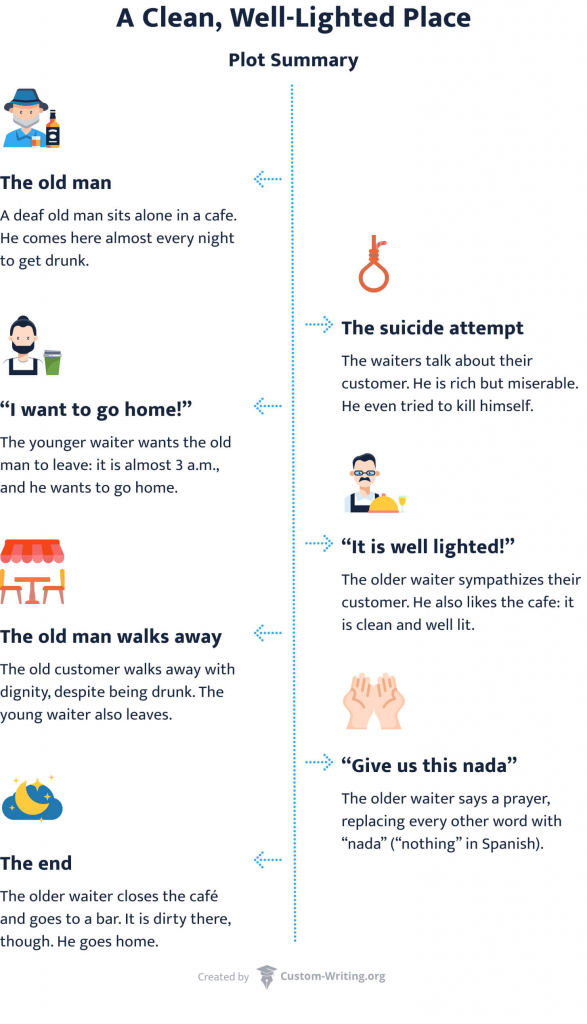Looking for A Clean, Well-Lighted Place summary and analysis? A short synopsis, an illustrated timeline, and a detailed summary & analysis of A Clean, Well-Lighted Place are below.
The analysis of a literary work starts from reading its full text. We can read this short story in less than an hour. However, a synopsis and a detailed summary highlight the central themes, setting details, and character traits. The information below will help you reveal the meaning of the plot. And if you have any questions, you can always ask our experts.
📉 A Clean, Well-Lighted Place Short Summary
It is past midnight. Two waiters discuss the last visitor who has attempted suicide but survived. He misuses alcohol, and the younger waiter refuses to serve him more. He wants the late customer to leave. But the older waiter sympathizes with the man. Then, he says that everyone needs a clean and light place.

📖 A Clean, Well-Lighted Place Summary & Analysis
After midnight, an old and a young waiter and a late visitor are sitting in a cafe. The first two wait for him to leave, but the old man is already drunk. He does not show any signs of willingness to go home. He sits in the shadow of a tree created by electric light.
The short story uses repetitions to enhance the emotional effect and create contrasts. The lateness of the day and lateness of years is a perfect example. The young waiter wants to go to his wife. He does not understand his colleague and the old man, who are not in a hurry. Youth never understands the elderly.
The waiters discuss their customer. He is old, deaf, and wealthy. Last week, he made a suicide attempt. The young man wonders why a person with a lot of money would attempt suicide. The old waiter replies that it was “Nothing.”
Nothing… He has plenty of money.
A Clean, Well-Lighted Place, Older waiter
Ernest Hemingway could have named his story “Nothing.” The futility of human life is the central theme here. The old man had nothing no live for. The old waiter is in the same situation, and he sympathizes with the customer. Money doesn’t solve all problems, but young people are not ready to understand them.
A soldier passes by with a girlfriend. They are busy with their feelings and do not notice anything around them. This unimportant detail emphasizes the difference between the young and the old.
The café visitor wants another brandy. The young waiter gets irritated as another glass will make him stay at work longer. He complains that he never returns home before 3 AM.
He’ll stay all night… I’m sleepy now. I never get into bed before three o’clock. He should have killed himself last week.
A Clean, Well-Lighted Place, Younger waiter
The reader starts having a fellow feeling toward the waiter, but his further actions undermine this compassion. He comes up to the visitor and says, “You should have killed yourself last week.” He pours another glass of brandy, and when the old man asks to make it to the top, he adds and spills it over.
The young waiter keeps wondering why the visitor wanted to kill himself. In the course of this conversation, we learn that the old man gets drunk at the café every night. He lives with a niece who cut the rope on which he tried to hang himself. She did it in “fear for his soul.” Still, the man is lonely. He is about eighty and would have been better with a wife.
Hemingway hints that the presence of people and even relatives does not save us from loneliness. Money doesn’t either. Loneliness causes a lack of meaning in life or “nothingness.” The old man is deaf, which intensifies his isolation.
The old man asks for another brandy. The young waiter says as if speaking to a foreigner, “No. Finished.” And then, “No more tonight. Close now.” The visitor pays for the drink and gives a small tip to the waiter. He leaves, walking with dignity, despite his drunkenness.
Everything ends at some point. The world has endless resources for love, money, fame, happiness, and other good. But they are not available to everyone, especially if you are old. The only thing you can do is preserve dignity. Note that the man tips the waiter, despite his rudeness.
The waiters argue about the importance of time for different people. The young waiter says that his time is more valuable because his wife is waiting for him. He has a job, a family, and confidence in the future. His colleague replies that he has only a job.
I am of those who like to stay late at the café… With all those who do not want to go to bed. With all those who need a light for the night.
A Clean, Well-Lighted Place, Older waiter
Through this unlikeable character, Hemingway shows that confidence (or security) is an unstable thing. The elderly visitor and the older waiter may have had it before. But life has taught them that life is unpredictable.
When the young waiter leaves, the old one stays to think why he felt fear watching the drunk visitor sitting in the café. He concludes that “It was a nothing, and a man was a nothing too.”
Nothing is a noun in this quote. It can replace any other word, creature, or phenomenon in a life devoid of meaning.
Then the waiter recites the Lord’s Prayer, replacing every other word with “nada” (“nothing” in Spanish).
Give us this nada our daily nada and nada us our nada as we nada our nadas and nada us not into nada but deliver us from nada.
A Clean, Well-Lighted Place, Narrator
This passage shows that religion is a weak motivator for a lonely person who does not have a purpose in life. Everything around the waiter is empty. But the only way to cope with this fear is to find a “well-lighted place.”
He goes to a bar, but it is not as good as his café. The bartender calls him crazy when the waiter asks to give him “nada” for a drink. This place is well-lighted, but it is dirty. The protagonist mentions this drawback to the bartender, but the latter ignores him. The waiter goes home.
Now, without thinking further, he would go home to his room. He would lie in the bed and finally, with daylight, he would go to sleep. After all, he said to himself, it’s probably only insomnia. Many must have it.
A Clean, Well-Lighted Place, Narrator
The last episode is about the need to preserve dignity even if there is nothing to live for. When the old waiter notices that the setting does not meet his emotional requirements, he leaves. And so should we do, according to Hemingway.
Thank you for reading this article! You might also want to take a look at A Clean, Well-Lighted Place essay topics collection. And if you need to summarize any text, try our summary-making tool. Any questions left? Check the QA section!
🔗 References
- A Clean, Well-Lighted Place | story by Hemingway | Britannica
- A Clean Well Lighted Place by Ernest Hemingway – Goodreads
- A Clean, Well-lighted Place – Literature Arts Medicine Database
- Ernest Hemingway’s A Clean Well Lighted Place – Academia.edu
- A Clean, Well-Lighted Place | The New Yorker
- A Clean Well Lighted Place by Ernest Hemingway – Study.com




















